Cara Gilger's Blog, page 12
October 23, 2019
What Ronan Farrow’s Book Catch and Kill Can Teach the Church
When journalist Ronan Farrow’s newest book Catch and Kill: Lies, Spies and a Conspiracy to Protect Predators released last week I read the entire thing in 36 hours. Since I haven’t done that since the luxurious days of middle school, that alone should say something about the quality of the book and the engagement with the material on which Farrow reports. While the subject matter is brutal as it outlines the way institutions perpetuated sexual abuse and assault specifically Harvey Weinstein, Matt Lauer and various NBCUniversal executives, Farrow approaches the subject matter with journalistic integrity and a straight forward attention to detail and reporting.
There were several moments in Farrow’s reporting of the behaviors of Harvey Wienstien, his associates and at NBCUniversal that he takes time to make connections around the structures of power that led to such terrible abuses. I found many of them easily translatable to the church as an institution and in local practice.
Board Structure
When the story around Harvey Wienstien is about the release, the board of the Weinstein Company met to address the problem. There are reports that it was heated, but in the end the board voted to continue his tenure. Farrow points out one specific practice that created a board without the strength to address these troubling allegations, specifically board structure. Harvey and his brother Bob were able to hold two spots on the board, there were several seats on the board that they could choose who filled them and the rest of the seats slowly over time were filled with other HW sympathizers. What it led to were enough people that been associated with or had benefited from Weinstien’s power that they were unable to hold him accountable.
This is interesting when we think in the church about long term pastorates and how the leadership positions of the church are filled. Most churches allow senior leadership either formal or informal influence over board nomination. Over time this can create a monoculture of thought and accountability. This practice alone may not lead to a senior leader that abuses power. Instead it can often be used to protect the staff that the senior leader hires and the overall culture. Maintaining a diverse board is also important if we are not in a long term leadership position–the structures we build will be inherited in all their health and dysfunction by another pastoral team one day.
Secrecy Culture
Another thread throughout Farrow’s accounting is the role that secrecy culture played in creating cultures of abuse. Often secrets were upheld under the guise of confidentiality, leaving processes of reporting, investigation and follow up muddled and unclear. Many of his accounts of complaints within NBC Today Show were handled in such a manner. This lack of clarity was intensional and served to make women who reported abuses feel unsure and threatened. Another symptom of secrecy culture was a pattern of passing the buck. When Farrow was drawing close to publishing his story with NBC executives played a game of round robin with responsiblity saying “the higher ups say” or “legal says” or “the people below me say,” while no one took direct responsibility for decision making. With no clear and transparent process executives were able to shirk responsibility and distribute blame.
It should also be said that silencing happens subtly–and that’s what makes it so effective. We tell female employees “I am sure it didn’t happen that way.” Or “I’ve known so and so for years and they are not like that.” Or “can’t you just let it go?” These are all tactics that create circles of silence.
In church culture we deal with lots of highly confidential information, but there is a difference between maintaining professional confidentiality and creating a culture that lacks transparency and accountability, incubating secrecy. Every church should have a safe church policy and practices in place, updating them annually to reflect changes in best practices in this evolving landscape. Aside from safe church policies and procedures, it builds a healthier organization when how decisions are made and who makes them is clear. As Brene Brown says “clarity is kindness.” Clarity also creates safer spaces for people to encounter God and trust that when they have been harmed that their harm was not at the hands of or perpetuated by God’s presence made known in Christian community.
Circles of Silence
There were several instances in Farrow’s reporting where women were scared to come forward, often fearing retaliation or the loss of their careers. However, Farrow also talked about how many victims were encouraged to tell no one, often by close confidants, friends and mentors. These circles of silence created shame for women who experience sexual abuse and assault but it also created space for bad behavior to continue. What works about circles of silence is that they are informal and relationship based. Our relationships, put theologically our incarnational connections of the Spirit, are powerful tools that build strength and can also encourage silence.
In the church we cannot create circles of silence that like cell phone service create dead zones where the telos of the Gospel is not the driving principle, where stories cannot be heard and honored.
Power Over Process
When you try to talk to pastors about power they generally handle it like a dirty gym sock. They pinch their nose and hold it at arms length, while completely ignoring that the sock got stinky and sweaty because they wore it to play the game. Personal and organizational denial of power is at least lazy and at most dangerous. If we lead organization where people gather, we have implicit and explicit power. Power denied or minimized is power not managed with intention and thoughtfulness.
Instead of denying or minimizing our power as religious leaders we should be thoughtfully interrogating that power, asking questions like…Who holds explicit power in this organization and how does that differ from whom hold implicit power? How do I function in the current power dynamics and what can I do to use that power with wisdom? Who does the process protect? How does the process prevent future abuses of power?
Working with church staff and overseeing Christian Education for sixteen years I firmly believe that one of the most important things we can do as pastors and church leaders is to create a safe space for encountering God. Part of that is reckoning with our past and present practices that have left our beloved communities vulnerable to harm. We often erred on the side of protecting the privacy of people who were accused of misconduct rather than protect the spiritual formation of those who were harmed in our midst. Those days are quickly and thankfully coming to an end. Whether we like it or not, this is part of the healing work of Christ in our day–that we might confess, repent and care for our people better than we did in the past, creating spaces where people can heal.
Like what you’ve read? Want more? Sign up for my twice a month newsletter (because we’re not spammy) and get original content you can’t find here on the blog. Reflections on faith and living, book recommendations and other good, nerdy fun. Sign up HERE.
October 16, 2019
Our Endings are for the Kindom
I sat on the phone with a dear friend and colleague, listening to their lament. “Damn” I said, because that’s what ministers sometimes say to each other when we talk about hard things. The church they were serving was headed toward closure and my friend was dismayed because this community was beloved to them. “How am I going to do this?” they asked, that single question holding universes of meaning. How will I guide them well? How will I say goodbye to a community I love? How will I hold up the mirror so that they see what I see about their future?
Weeks, maybe months pass and I am on the phone with another friend. They are doing incredible justice work in their community. Their church has been bold enough to say yes to God’s calling to lend their power to the poor and bridge racial divides long etched into the community. Yet, there is a slow trickle of beloved members leaving–they think being vocal about Jesus’s call to love our neighbor means the church has become “too political.” They are not mad or mean, but they are leaving. It has broken my dear colleague’s heart. Each person that is leaving is someone my friend has loved dearly and served alongside for years. They have buried their dead, married their children and ushered into the baptismal waters many of them and know them by name, the way God knows the hairs on our head.
They asked “I feel like I need to do something, to reach out to these families, but I don’t know how. Is this like an exit interview? I don’t want to be beat up but I feel like they can’t leave without someone saying ‘hey I notice you’ve left and you matter.’”
To each of my friends I say the same thing “this is terrible and I am so sorry that you are going through this.” When you dare to love big, you do not carry your losses lightly, loose and jangling in your pocket. They sit like a cold stone in your stomach.
We are part of the larger work of the Kindom of God. Yes, our church is a manifestation of the local, communal work of God in the world, but we are not the only work. As much as I would love to think that every person that leaves a church goes to another church and makes a new home one where they can come to bless that church with the gifts that their former church will miss, I fear (and have observed) that many do not. They simply slip from being the four Sundays a month members of our church to people who go to Starbucks, visit family a few hours away or sleep in. They may find another church to attend, but you hear through the grapevine in town that they only attend occasionally. This feels like its own loss, the church has these beloved’s gifts but they have lost the richness of spiritual growth that happens in the gritty and beautiful practice of Christian community.
And so I said to each of my colleagues, “Our endings are for the Kindom. We are called to specific churches but we are called to the higher calling of our ordination. In the traditional sense we are ordained representatives of Christ in the world. When we think about caring for people in the ending of their relationship with our churches we have to think about how to minister to them in such a way that they know the Kindom is for them, that God welcomes them joyfully despite whatever differences we may have. It is not a win for the Kindom if they stay at home and aren’t a part of another community that is shaping hearts for the Kindom. For better or worse we are the people that shape their future relationship with the church.”
In a tradition where life and death play such a meaningful role in how we make sense of our life with God, we need to remember that deaths are invitations to life. Even when the deaths bear the sharp sting of something deeply personal. Our endings are for leaving the door of the Kindom open for those who might walk out the door of our churches. Our endings when oriented towards the work of the Kindom don’t eliminate the personal sting, but rather re-orient our response to be grounded in grace. Our endings weighed with grief and hard decisions are as much for the Kindom as our joyful beginnings, if not more so because we are teaching about the love of Christ that can endure hard things.
When the door of the Kindom is left wide open, knocking on its hinges and grace is the guiding spirit of relationship I have seen beloveds return to church. I have heard “I was wrong about the reason I left and I am back, we love what God does here.” Our endings are for the Kindom because they are beginnings in disguise.
Like what you’ve read? Want more? Sign up for my twice a month newsletter (because we’re not spammy) and get original content you can’t find here on the blog. Reflections on faith and living, book recommendations and other good, nerdy fun. Sign up HERE.
October 7, 2019
Temptation by Nina Cassian
Call yourself alive? Look, I promise you
that for the first time you’ll feel your pores opening
like fish mouths, and you’ll actually be able to hear
your blood surging though all those lanes,
and you’ll feel light gliding across the cornea
like the train of a dress. For the first time
you’ll be aware of gravity
like a thorn in your heel,
and your shoulder blades will ache for want of wings.
Call yourself alive? I promise you
you’ll be deafened by the sound of dust falling on furniture,
you’ll feel your eyebrows turning to two gashes,
and every memory you have–will begin
at Genesis.
(translated from the Romanian by Brenda Walker and Adrea Deletant, published in Joy: 100 Poems edited by Christian Wimen)
September 25, 2019
11 More Books to Enrich Young Faith
The creativity it takes to teach children always requires keeping an eye out for books and resources that can connect the stories of our faith to the experiences of our children. There’s nothing more exciting than watching a child’s imagination come alive with questions and excitement for God. I shared earlier this year my favorite collection of books for enriching young faith, but there are new books available that I wanted to share. Like before, some books are explicitly faith based, others offer reflection on a topic that ties to a theological theme or particular piece of scripture. I think it’s powerful to use books that are not explicitly faith based. I love seeing kids light up when they make the connection between what they are reading at school and their faith.
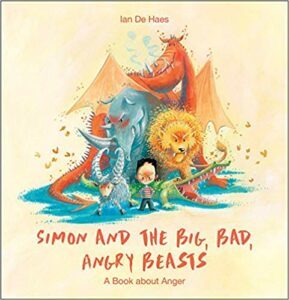 Simon and the Big, Bad, Angry Beast: A Book About Anger by Ian De Hais
Simon and the Big, Bad, Angry Beast: A Book About Anger by Ian De Hais Anger is a destructive feeling, but it is one we all experience. Teaching kids to navigate anger also teaches them mindfulness, kindness and compassion. We can’t teach the fruits of the spirit without teaching our kids how to manage the feelings and actions that make those fruits difficult grow. Simon and the Big, Bad, Angry Beast is a book that captures the nuance of anger–how its power can make you feel good but how it destroys connection and relationships. This book is a must have. I also really love the five pages of parent and teacher resources in the back–which give parents a way to engage the book and help their kids process anger.
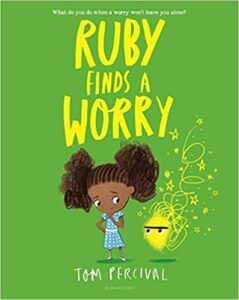 Ruby Finds a Worry by Tom Percival
Ruby Finds a Worry by Tom Percival Matthew 6 says “do not worry about tomorrow, for tomorrow will bring worries of its own. Today’s trouble is enough for today.” Our kids have worries big and small, often unseen to our adult eyes. God wants to meet our kids in their worries and help them make sense of them. Ruby Finds a Worry is an excellent resource to bridge the scriptures on worry with a concrete conversation on emotional intelligence, friendship and connection.
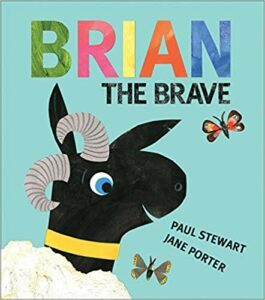 Brian the Brave by Paul Stewart
Brian the Brave by Paul Stewart It is not only socially responsible to teach our kids about how to navigate difference, but it’s faithful. I think of the story in Matthew 8 where Jesus heals the leper, a story that says just as much about God’s healing power as it does Jesus’s willingness to spend time with people who were considered outsiders. Brian the Brave is about a flock of sheep that want to see their differences until a wolf comes along and they realize each of their gifts can help the whole. This would also be a good book to illustrate to younger children the teaching in 1 Corinthians about there being many parts but one body.
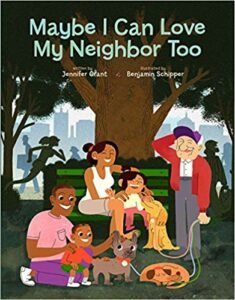 Maybe I Can Love my Neighbor Too by Jennifer Grant
Maybe I Can Love my Neighbor Too by Jennifer Grant The core scripture of Christian faith in Mark 12 says “you shall love the Lord your God with all your heart, and with all your soul, and with all your mind, and with all your strength…You shall love your neighbour as yourself. There is no other commandment greater than these.” In this follow up book to Maybe God Is Like That Too, Jennifer Grant paints a picture of what it means to love our neighbor in concrete ways that capture young imaginations in Maybe I Can Love My Neighbor Too.
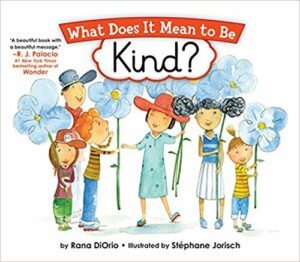 What Does it Mean to be Kind? by Rana DiOrio
What Does it Mean to be Kind? by Rana DiOrio In Paul’s letter to the Corinthians he talks about what love looks like in community “love is patient, love is kind…” but how do we teach our kids what kindness looks like in their lives? What Does It Mean to Be Kind? teaches children how to imagine kindness in the world and in their relationships. This book takes the abstract concept of kindness and give concrete examples and ideas.
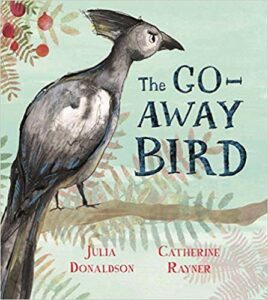 The Go Away Bird by Julia Donaldson
The Go Away Bird by Julia Donaldson “Two are better than one, because they have a good return for their labor: if either of them falls down, one can help the other up.” The passage from Ecclesiastes is commonly used in weddings but it’s also an excellent passage to teach children about friendship. The Go Away Bird is about a bird that doesn’t think it needs any friends, until a big bird of prey comes and then The Go Away Bird discovers that friends might be important.
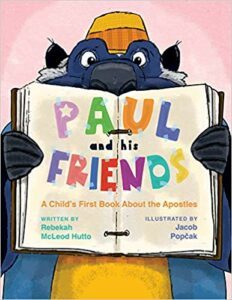 Paul and His Friends by Rebekah McLeod Hutto
Paul and His Friends by Rebekah McLeod HuttoI love this book as a basic overview to all the evangelist that helped Paul in his ministry. Paul introduces each of his friends and how they helped him in his faith and spreading the love of Jesus. One of the features of Paul and His Friends that I love is that in the end there are scripture references, the animal characters of each apostle is explained (spoiler, each character is depicted as an animal and each animal is drawn from metaphor or early Christian art) and there is even a page for kids to draw a picture of their friends in faith.
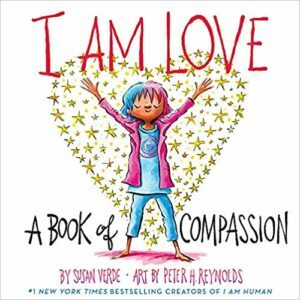 I Am Love: A Book of Compassion by Susan Verde
I Am Love: A Book of Compassion by Susan Verde This book is the perfect companion to the “love verses” from 1 Corinthians as it talks about the multifaceted aspects of love–that love is not one thing but the compilation of many small kindnesses. I Am Love book starts with noticing that someone else is hurting and spins into a lovely illustrated exploration of what love is–compassion, forgiveness, connection, effort, remembering and creative.
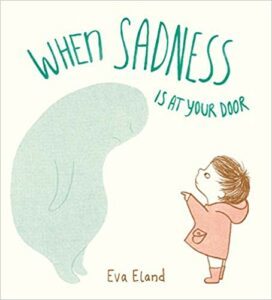 When Sadness is at Your Door by Eva Eland
When Sadness is at Your Door by Eva Eland This is a book that I talked about in my round up of books to help children with grief and emotional intelligence, but I think it has specific faith connections. The scriptures are rich with lament and our faith teaches that God is with us in our heart ache. Specifically when we immerse ourselves in the Psalms. When Sadness is at Your Door would be an excellent book to talk about sadness, teach emotional intelligence and talk about God’s presence with us when we are sad. When I talk to my own kids about sadness, I also talk about the beloved community that surrounds and supports them in their faith journey even when they are sad and the role of prayer in connecting to God.
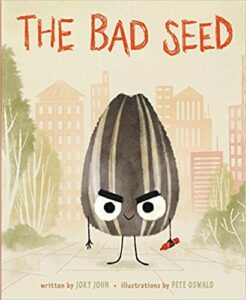 The Bad Seed by Jory John
The Bad Seed by Jory JohnThis is another book that isn’t explicitly faith based but absolutely captured my children’s imagination and spurred conversation about friends and classmates that was depthful and rich. This book follows a “bad seed” that makes poor choices but discovers that making bad choices isn’t great and that he would really like to be a good seed. The Bad Seed is a great book to talk about choices, how God created us good, how to make choices that are rooted in God’s love and how to understand ourselves as mostly good even when we make mistakes. This is a great book to tie into a conversation or lesson about making wise choices, sin, forgiveness and grace.
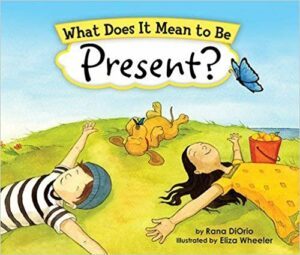 What Does it Mean to be Present? By Rana DiOrio
What Does it Mean to be Present? By Rana DiOrioOur kids are bombarded with stimuli, on a neurological level they need to practice stillness, quiet and attention. Not sitting still but quieting the mind from the many distractions and worries modern life throws at them. The Christian tradition is full of rich spiritual practices that help quiet the mind and center the spirit, because presence is about being attentive to God’s presence in the moment so that we can make Spirit-filled choices. What a gift to our children to teach them the spiritual practice of presence. What Does it Mean to be Present? Is an excellent book to teach children about being present.
We love reading and so many books and stories create the opportunity to talk about faith. When we make faith a part of our reading lives we make faith part of our daily lives. It’s a gift to teach our kids to notice God in their relationship, community and reading. If you enjoyed this list, I have another one with 20 Books to Enrich Young Faith you can check out.
Like what you’ve read? Want more? Sign up for my twice a month newsletter (because we’re not spammy) and get original content you can’t find here on the blog. Reflections on faith and living, book recommendations and other good, nerdy fun. Sign up HERE.
September 24, 2019
Don’t Hesitate by Mary Oliver
“If you suddenly and unexpectedly feel joy, don’t hesitate. Give in to it. There are plenty of lives and whole towns destroyed or about to be. We are not wise, and not very often kind. And much can never be redeemed. Still, life has some possibility left. Perhaps this is its way of fighting back, that sometimes something happens better than all the riches or power in the world. It could be anything, be very likely you notice it in the instant when love begins. Anyway, that’s often the case. Anyway, whatever it is, don’t be afraid of its plenty. Joy is not made to be a crumb.”
Mary Oliver “Don’t Hesitate” from Swan: Poems and Prose Poems
September 19, 2019
Review: The Lightest Object in the Universe
Normally I don’t write stand alone book reviews, however occasionally a book comes along that is so striking and thought provoking that I want to talk about it…a lot. The Lightest Object in the Universe by Kimi Eilese is the first book of 2019 that completely captured my heart and imagination.
The Lightest Object in the Universe follows Carson and Beatrix as the struggle to find their path in this new world, one where the technologies and structures of modern culture no longer exist. Carson, on the East Coast, is desperate to find Beatrix, and so embarks on a cross country trek where he encounters an odd array of travelers including those who are following the broadcast of a religious leader claiming to offer relief. Meanwhile, Beatrix wrestles with settling into a community that before things changed she spent most her time fleeing to help other communities. And then there Beatrix neighbor, a fifteen year old girl with one blue eye and one brown that has premonitions of the future, of all of their futures.
I absolutely love the post-apocalyptic genre for the ways it offers a critique of the human condition and casts a vision of humanity that is hopeful. When done well, the apocalypse becomes merely a backdrop to wrestling with themes around human nature and imagining other dynamics of human life, art, beauty and community. A strong example is Station Eleven by Emily St John Mandel. However, I am picky. I am not interested in social Darwinism as the primary view point, where humans are in a competition to see who can be the most morally compromised (I am looking at you The Walking Dead and The Hunger Games). While these stories can be entertaining, who doesn’t cheer for Katnis and Rick Grimes, their primary driver is what is wrong with humans, not what could be good or kind or beautiful within humans. There is a destructive element that leaves little room for creative construction of our world to be the final or ultimate future. We read to discover what is ultimate in our stories, our hopes and our fears.
What captured my heart with The Lightest Object in the Universe was the way Eisele is able to tease out the multifaceted aspects of grief and the many ways that people respond to loss. As a pastor I know that grief can inspire people to respond in strange, destructive and often beautiful ways–she captures all of these nuances and more. Each character is grieving and has their own way of wrestling out their grief for what was, what they have lost in this new world and what is no longer possible for their future. Counter balanced to that is themes of love–how we love in light of loss? What does love mean in a mortal world? Can we envision a world where love for our neighbor is our highest value?
I also thought that Eisele did a good job troubling both ends of the theological spectrum. The radio preacher promising people creature comforts such as ice cream and a new life offered a commentary on theological answers that don’t ask good questions of our suffering. In our despair it might be easy to follow answers that keep the wrestling of deep questions at bay, but at what cost? On the other end Eisele created a sharp critique of the social justice movement rooted in liberal theological practice that often focuses on external problems and forces, while neglecting the hyper-local needs of communities. As Beatrix wrestles with how to become a part of the community in her own neighborhood, I was moved by the sense that we don’t have to wait for the apocalypse to build better communities of care now. The faith in what could be built now is as fledgling as the faith in the radio preacher. None of the theological options in Eisele’s world come without vulnerability, but it’s what that vulnerability yields that reveals what is at stake in these views. There was also an underlying question about scarcity versus creativity when in comes to how we live in relation to one another that was thoughtful and nuanced.
Meanwhile, as Carson travels across the country his character is wrestling with related question–are people mostly good, albeit complicated or mostly bad, evoking fear and mistrust? Again, where Eisele could be single minded in her argument there is nuance and texture to how she presents the issue. The characters he encounters offer different, if not always clear answers.
I highly recommend this book to anyone that wants to dream of a better now. Have you read it yet? If so, what was the most striking theme for you?
Like what you’ve read? Want more? Sign up for my twice a month newsletter (because we’re not spammy) and get original content you can’t find here on the blog. Reflections on faith and living, book recommendations and other good, nerdy fun. Sign up HERE.
September 9, 2019
Five Books to Encourage Self-Reflection and Growth
As I mentioned in my post earlier about healing from a broken (pastor) heart, seeking ways to grow and do self-reflection on your biases, blindspots, trauma and history is an important part of healing as a pastor. I encourage clergy to seek out a professionally trained person to talk to-a therapist, counselor, spiritual director, coach or reiki practitioner to help sift through these themes as they show up in your relationships and ministry. But there are some times where geography (hello small town ministry where everyone knows everywhere you go!) or finances (can we all say student loans) can prevent you from getting this kind of help. That doesn’t mean you can’t go to your public library or hit up Amazon and get some resources that can be used as a tool to help you work through your stuff.
Even though I am weary of the whole “self-help” genre that often doesn’t take into account family history, social location, systemic biases and other things that make up your specific situation, there are some books that I think do a good job with asking good questions and guiding solid self-reflection. While this is by no means an exhaustive list here are a few books I recommend for self discovery and reflection:
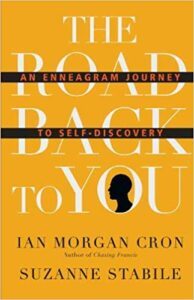 The Road Back to You: An Enneagram Journey to Self-Discovery by Ian Morgan Cron and Suzanne Stabile
The Road Back to You: An Enneagram Journey to Self-Discovery by Ian Morgan Cron and Suzanne Stabile The Enneagram is all the rage right now with tons of experts popping up on the internet with cute memes and snarky commentary. The Road Back to You provides a solid introductory to the Enneagram personality typology by two authors that have spent years developing and studying this tool for knowing ourselves and others.
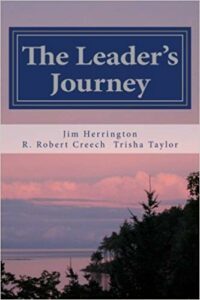 The Leader’s Journey: Accepting the Call to Personal and Congregational Transformation by Jim Herrington, Robert Creech & Trisha Taylor
The Leader’s Journey: Accepting the Call to Personal and Congregational Transformation by Jim Herrington, Robert Creech & Trisha Taylor This book is a personal classic. When I was first starting in ministry and friend and colleague of mine gave me a copy. I read it every few years because the content is just that good. It focuses on systems and how we play a part in changing or maintaining systems in the church. Not a reader? You are in luck with this one, as the authors now have a podcast where they present many of the theories in depth on the show.
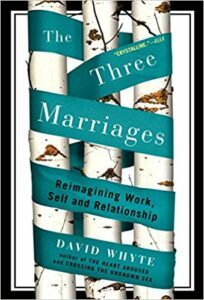 The Three Marriages by David Whyte
The Three Marriages by David Whyte I love the poetry of David Whyte but I have also found helpful this book on the relationship between vocation, the self and significant relationships. This is a good book to help reflect how you balance the multiple facets of your life–being a pastor with a passion for your work, a person separate from your work with your own unique needs and desires and a person who is in relationship with others, whether that is a spouse or deep friendships. Whyte invites the reader to reflect on the importance and value of each to feed the other.
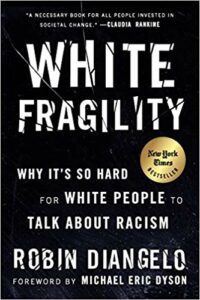 White Fragility: Why It’s So Hard for White People to Talk About Racism by Robin DiAngelo
White Fragility: Why It’s So Hard for White People to Talk About Racism by Robin DiAngeloPastors, we can not talk about healing ourselves and our communities without talking about racism and its systematic effects on our communities and how we think and view the world. Part of our journey to self-discovery as a pastor includes examining the systems, practice and biases that shape our lives. Di Angelo does an excellent job helping readers understand the issues at hand and facilitate reader self-reflection. I highly recommend reading this book with a friend or in a cohort group that can help you process and hold you accountable.
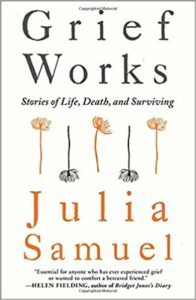 Grief Works: Stories of Life, Death and Surviving by Julia Samuels
Grief Works: Stories of Life, Death and Surviving by Julia Samuels Loss is a part of living and grief is a part of loving. This book written by British grief psychotherapist Julia Samuels tackles various forms of grief through the personal stories of her clients as well as offering specific reflections and suggestions on how to make sense of our loss. This book is essential to any pastoral library, but it is also a helpful tool for reflecting on and processing grief as a pastor.
This is not a comprehensive list, just some of the better resources I have run across. So, what have you read that you have really grown from?
Like what you’ve read? Want more? Sign up for my twice a month newsletter (because we’re not spammy) and get original content you can’t find here on the blog. Reflections on faith and living, book recommendations and other good, nerdy fun. Sign up HERE.
How to Heal a Broken (Clergy) Heart
It took me seventeen years of ministry and five congregations before I had my heart broken by a church. It is one of the risks of the vocation. When God calls you serve people, to walk alongside them, getting to know their stories, dreams, and fears, when you dare to share dreams together for what a community of people can be, you can have your heart broken. We fall in love with God’s potential for a people and for the community. I never want to live a ministry that would callously protect me from the heart ache of things not working out. I want to lead from joy and leading from joy means leading with your heart wide open for the potential of what God can do with a specific group of people. It’s vulnerable but totally worth it.
As I have traveled to speak and preach, I’ve connected with lots of my clergy colleagues. They want to know what happened…which is hardly interesting or relevant. I could tell them about pay that was abysmally low compared to the cost of living and childcare in the area or the long hours stretching from day to evening and swallowing up most weekends or the unhealthy systems beyond my ability to shift. I could tell them about the amazing potential the church had and name each beautiful thing God could do without a constant and consistent “no” from leadership. But I have learned to simply say “it’s the first time I’ve had my heart broken by a church” with a shrug. Without exception each of my colleagues has nodded that gesture of deep knowing. “Only one so far?” a veteran colleague asked, “you’re lucky, I’ve had many.” Or as another colleague marveled “I can’t believe you are still in ministry.” Why, yes, yes I still am. This calling is big and beautiful and complex, it can-and does- hold a multitude of truths. So I thought I would share what has helped me make sense of church-heartbreak and make the shift to a new call with a sense of grounding.
Phone a Friend (Or Better Yet Make IRL Plans)
I cannot emphasize enough how valuable friendship is for life in general, but when you have had your heart broken by a church it is essential. Having a friend or group of friends that you can call that know you, can reflect the truth of who you are and your value in the midst of the confusion of heartbreak, is so healing. These are also the people that can nudge you to reflect…maybe you didn’t handle the situation in your church perfectly. Who actually ever does?! If you are lucky, your friends are the people that will gently help you begin a healthy reflection process, while not beating yourself up. It’s even better if you can meet for coffee or lunch and see each other in real life–Jesus was incarnational and we should try to live an incarnational life by having friends that we do life with in person as well as cross-country.
If you can, make sure you have at least one non-churchy friend. The best gift I have ever received was from a friend that said “you get five minutes to rant about this church situation and then we are going to talk about something else we can both enjoy.” You need people that can remind you of your call, but you also need people that can remind you that you are a whole, beloved person outside of this moment of difficulty. People who don’t see the church as the be all and end all of your identity. Friends that remind you there are books and movies and music and activism to discuss over coffee and not just your church.
Get Honest About Your Shit (And Talk to Someone)
When something goes sideways in a call and breaks your heart, it’s a good time to work through what is going on in you. We all have different motivations for being in ministry and serving others. Those motivations shape how we behave in certain situations, particularly stressful situations. Get honest with yourself about your shit–your history, biases, habits, behaviors, trauma and motivations so you can grow from this unexpected situation. You may not have caused the situation but you were a part of it. It can either shape you for the negative or it can help you reflect and grow.
Talk to someone–a counselor, therapist, coach, spiritual director, reiki practitioner, you choose the modality that works for you emotionally and financially. Pick something you will be open to doing because if you show up closed off and unwilling to do the work, the time and money you invest will be fruitless. Don’t think you can afford to talk to a professional? Re-evaluate your budget again, make this a priority. Still can’t? I get it, I’ve been there…go to the library and check out a book on the Enneagram or another book that might help guide your self-reflection. Need some ideas on where to start, check out my list HERE.
Get Clear About Your Calling
One of the things that grounded me in my transition after a heart breaking congregation was being clear about my call. I am crystal clear that God is calling me to serve the world by using my gifts to the fullest. No community or situation can change or draw into question that fundamental truth about how God has called me to live in this world. Being clear about your call can ground you in ways that are so essential. It can also help you think about how to move forward, whether that’s to continue in the same context with a different tack or seek a new community to live out your call in. Being clear about your call is being clear about who God created you to be and what God is calling you to do in light of those beautiful gifts.
Need help clarifying your call? Use your circle of people as conversation partners–mentors, colleagues and friends. Ask them to reflect back to you times when they have seen your shine–a sure glimmer of God’s gifts working in you. Or when they have heard you get really excited about the work that laid before you. Your circle can also reflect to you what you don’t enjoy or thrive doing. Many clergy I know are competent in a multitude of things, but there is a difference between being able to do something well and actually being called to it. Not an extrovert or into group work? Use your prayer and reflection time each day to write out your calling. Start with a simple question and answer it each morning “Who am I and who is God calling me to be?” Over time you might see some patterns emerge that can help you clarify your call.
Take a Walk and Cook Some Veggies
It is a deeply damaging myth we are slowly unraveling that tells us we are minds and bodies, spirit and bone. We are whole and holy beings. Taking care of your body IS taking care of your spirit as you heal and grieve. Yes, you need to go get chips and salsa with friends and laugh. But you also need to take a walk and move your body. Some of the writers and leaders I admire most (Saint Mary Oliver among them) talk about walking as a way to move the body and the mind to imagine new possibilities, to cultivate the practice of noticing (both things in them and in the world) and to harness the ability to listen to what God is saying or doing in their lives. If you have been hurt by a community you loved and prayed for, you also need to tend to the part of you that needs to imagine and dream. Why not get the whole of you moving?
As for the veggies, veggies never killed anyone. In fact, they taste good and make you feel better. Feeding yourself well will give you the physical clarity you need to work through your sense of loss.
Remember Your Joy
Ministers can be some of the most serious people I know. Let’s be honest, we pastor in some dark crises, we bury the dead, we know the intimacies of people’s broken and we often have very dark senses of humor. But as I have said before, joy is not made to be a crumb and neither is your call. As Ross Gay reminded me in an interview I heard “Joy has nothing to do with ease and joy has everything to do with the fact that we are all going to die.” Ross Gay is a poet but I also feel like he would be right at home with clergy. When you have had your heart broken by a church you are at risk of leading from your cynicism, bruised ego, fear of being hurt again, grief or doubts, but God delights in you and your ministry. Joy makes a far better soil to ground your ministry in than heartache or brokenness. It is in light of the mortality of our lives and the impermanence of our calls that we can tap into joy. This call is joyful. Our ability to use our gifts to serve God is a joy, remember that and tend to it as you heal.
We are called to serve a God that loves us deeply and yearns for our health and wholeness. Your ministry will gain a richness and beauty in growing though this challenge and I can’t wait to see what you do next.
Like what you’ve read? Want more? Sign up for my twice a month newsletter (because we’re not spammy) and get original content you can’t find here on the blog. Reflections on faith and living, book recommendations and other good, nerdy fun. Sign up HERE.
August 28, 2019
Summer Reading Recap 2019
It seems strange in Texas to do a summer reading recap when it’s still hot as an over outside but this weekend is Labor Day, college football has started and everyone is back in school so it’s time to take a look back. Summer and winter are when I consume the most books and I generally like to read from a variety of genres. I have my favorite go-to genres but I try to break up my reading to keep it interesting. Too much of one thing leave me unenthused. I didn’t read nearly as much fiction as I usually do in the summer because my manuscript research reading took precedent for my early morning and daytime reading which will continue in the fall.
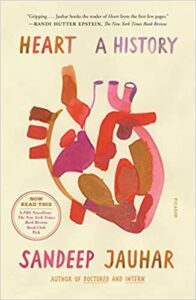 Heart: A History by Sandeep Jauhar
Heart: A History by Sandeep JauharI devoured this book quickly and with focus after I purchased it at a small independent bookseller in Jackson, Wyoming on vacation. Finding this book is a testament to why browsing a local bookshop is so much better than Amazon. This title would have never found its way to me if I hadn’t been cruising through browsing the stacks. I grabbed Heart: A History as part of my research for my current manuscript, but it was a fascinating and tender read. Jauhar does an excellent job balancing the history and technical information with his own personal narrative and a gentleness born of someone who has a passion for excellent patient care.
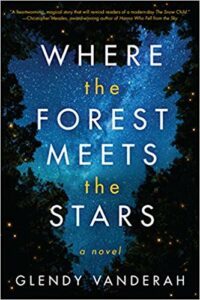 Where the Forest Meets the Stars by Glendy Vanderah
Where the Forest Meets the Stars by Glendy VanderahI have a very dear friend I met through my daughter’s dance studio and we often pass books back and forth. Where the Forest Meets the Stars was tucked into a stack she gave me this spring and when I checked the reviews on Goodreads I thought I would give it a go. I was instantly drawn into Ursa’s world just as the rest of the characters in the book were. This book is a lovely read about the power of relationships to heal and save us without the theme being too obvious or preachy.
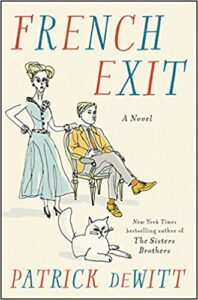 French Exit by Patrick DeWitt
French Exit by Patrick DeWittThis is another book that came to me via a local bookstore recommendation. I was in the Notting Hill Bookstore store and asked the clerk what she had read that she had enjoyed. She recommended this dark comedy that I would say is in the same vein of Marie Semple’s Where’d You Go Bernadette? Filled with quirky characters and entertaining interactions, French Exit made me laugh at a book in ways I haven’t in a long time.
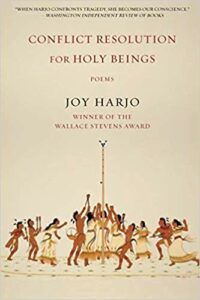 Conflict Resolution for Holy Being by Joy Haro
Conflict Resolution for Holy Being by Joy HaroAbout a year ago I realized I had a real gap in reading the stories, poetry, research, voices and theology of native peoples. So I have been practicing mindfulness in selecting my books to prioritize native authors. This year I haven’t purchased many volumes of poetry, but decided to snag a copy of Joy Haro’s Conflict Resolution for Holy Beings to add to my collection. This volume is a delight and a fresh voice for me, I have loved reading a poem each morning this summer.
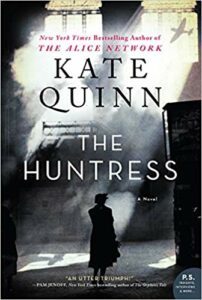 The Huntress by Kate Quinn
The Huntress by Kate Quinn I really dig a well done historical fiction but they are hard to find since so many are so bad. And by bad I mean they are sappy love stories, they follow common tropes, oversimplify the time they are set in and make characters flat and lacking ethical nuance. The Huntress is not one of those books, this book keeps a solid pace of action, the characters are complex and interesting. I was not familiar with Kate Quinn’s work at all and now I am a huge fan thanks to The Huntress.
 Grief Works: Stories of Life, Death and Surviving by Julia Samuel
Grief Works: Stories of Life, Death and Surviving by Julia SamuelThis is another book that I would not have discovered had I not been browsing in a local bookshop in London. It caught my eye and I knew as a pastor and writer I had to read this best seller in the UK on grief. I appreciated how this book was written with a combination of personal narrative, commentary that provides meaning making and explanation and concrete information and suggestions for navigating grief. I wish I had Grief Works sooner in my pastoral ministry as a resource for families.
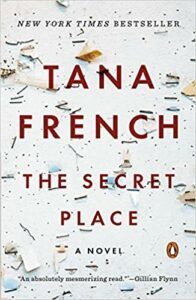 The Secret Place by Tana French
The Secret Place by Tana French I have written before about how I enjoy Tana French’s Dublin Murder Squad series due to her ability to write strong female characters, a series that piggy backs but doesn’t require you read every book. The Secret Place was enjoyable but probably falls in the middle of the pack in terms of Tana French books, I listened to it via my library app while tackling house projects, it was entertaining and held my attention while I cleaned, sweated, painted and built things. Would it have held my attention if I were just sitting to read it? Probably.
 Naturally Tan by Tan France
Naturally Tan by Tan France I mostly listened to Naturally Tan via audiobook from my library and found it a nice, light palette cleanser as Tan candidly talks about his childhood and life. The hidden gems in this book are when Tan is talking about building his businesses and when he speaks of his marriage. His business advice is solid and rooted in successes I had no idea about from watching Queer Eye. And Tan’s candid discussion of he and Rob’s marriage was equal parts honest and tender.
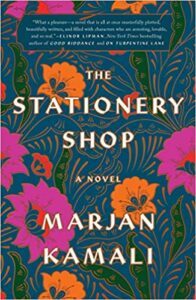 The Stationary Shop by Marjan Kamali
The Stationary Shop by Marjan Kamali I was drawn to this book for two reasons–the cover is gorgeous and it was set in a time and place in the world that I know very little about through my education and reading. Set in Tehran in the 1950’s The Stationary Shop follows Roya as she falls in love and then is pulled apart by social and political forces. I always find the missed connection romance a less interesting plot but the setting and the story about her love after moving on kept me engaged.
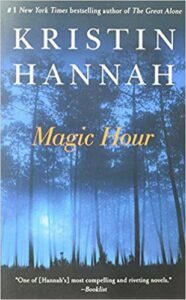 Magic Hour by Kristin Hannah
Magic Hour by Kristin Hannah The first Kristin Hannah book I read was The Nightingale (am I shamefully in love with WWII fiction with strong female leads? Why, yes, yes I am) and I loved The Great Alone for its profound sense of place and the way she captured the lonely bleakness of the Alaskan wilderness as if it was it’s very own character. But I had several bookish friends that didn’t like The Great Alone and when I asked them why they said “have you read her other books? They are so much better!” So naturally I had to check out her older titles and see what my bookish friends were talking about. Magic Hour takes place in a small town on the Olympic Peninsula in the Pacific Northwest proving that Hannah has a way of research and creating a sense of place that’s consistent throughout her books. The setting itself creates a sense of magic to the mysterious girl that appears out of the woods one day, with no trace of where she came from or who she belongs to. This book is about healing and family in a way that is thoughtful and not over simplified.
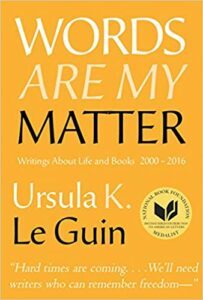 Words Are My Matter by Ursula K LeGuin
Words Are My Matter by Ursula K LeGuin I found this gem when I was in Iowa for a professional conference. I have a strange pattern of reading an author’s books or essays on the art of writing before actually reading their work. While it may seem rather odd, I like approaching their work with an understanding of what they are trying to do and how they are trying to do it. All of that is to say, I was virtually unfamiliar with Ursula K LeGuin’s science fiction work before picking up Words are My Matter. The essays in this book are not about how to write but what writing means, why it matters. What I particularly loved were her critiques on capitalism and its influence on the creative arts.
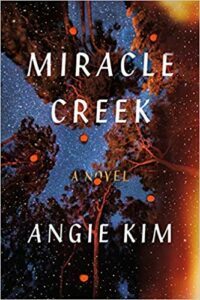 Miracle Creek by Angie Kim
Miracle Creek by Angie Kim Miracle Creek was offered as one of the Book of the Month selections and it grabbed my attention as both a mystery and a courtroom drama. I have meant to read this book all summer long and finally snagged it on audiobook through the library. I love a book that is written tightly enough that it grabs you from the first chapter and invests you in characters and the story but the pleasure of this book is that it presents complex and nuanced points of view that leave you thinking long after the book is over.
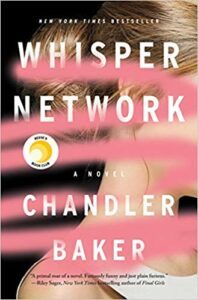 Whisper Network by Chandler Baker
Whisper Network by Chandler BakerIf you follow me on Goodreads you already know how I feel about this book! Whisper Network was billed as THE preeminent book of this #metoo era and the first thing I have to say is that if you still have a #metoo book in you–write it and publish it. I found this newest attempt at tackling the topic of toxic masculinity and its effects on women in the workplace to be a little stilted in stereotypes about women and lacking nuance. I struggled to care about the characters and hence didn’t really engage the plot either. I guess every summer has to have a dud and for me this was a total dud.
There are several books I had on my list for the summer that I didn’t get to so I am really looking forward to my fall reading list as well.
Like what you’ve read? Want more? Sign up for my twice a month newsletter (because we’re not spammy) and get original content you can’t find here on the blog. Reflections on faith and living, book recommendations and other good, nerdy fun. Sign up HERE.
August 23, 2019
Fighting Fear with Connection
Blessed are the poor in spirit,
for theirs is the kingdom of heaven.
Blessed are those who mourn,
for they will be comforted.
Blessed are the meek,
for they will inherit the earth.
Blessed are those who hunger and thirst for righteousness,
for they will be filled.
Blessed are the merciful,
for they will be shown mercy.
Blessed are the pure in heart,
for they will see God.
Blessed are the peacemakers,
for they will be called children of God.
Blessed are those who are persecuted because of righteousness,
for theirs is the kingdom of heaven. -Matthew 5
Last week was a difficult one with the violence in the national news. But for my family, it was not national news. My husband’s family is from El Paso, I have a very dear friend that lives there and so we waited and worried to hear from them. My children are also preparing to start public school and frankly, last week’s news of more gun violence left me really upset. So upset I didn’t want to go to church on Sunday morning. I didn’t want to go to a public space that is consistently targeted for mass shootings. It made me grumpy. And so I showed up to church grumpy, scared and worried, which in general is a terrible way to show up and try to interact with people.
The first person I saw on Sunday morning was Ms Pat. Well, I didn’t see Ms Pat, my youngest did and she went tearing down the hall to throw herself upon Ms Pat’s legs in a hug that was borderline dangerous as she nearly toppled the two of them in the Sunday School hallway. After they both regained their balance, Everly showed off her backpack a glittery and sequined contraption that needs a warning label and protective eyewear. She told Everly how happy she was that she was here this Sunday.
I was still grumpy and nervous after dropping my kids but on my way to the sanctuary I ran into one of my pastors. She asked how I was doing and I told her the truth. She looked at me earnestly and said “me too, I am also scared for my kids.” I felt seen and heard, but still grumpy.
As the praise band started up my older daughter begged me for her friend to join her in our pew. Her mom and I exchanged facial expressions and hand gestures and agreed the girls could sit together. Between giggles and whispers the sound of their sweet voices singing drifted up and through the pews. Next to me my parents slid into the pew, visiting from out of town and my mom squeezed my hand.
By the time the minister got up to preach I was not entirely thawed from the protective shell of grumpy indignation I had been building all week. But then he started his sermon talking about the exact things that were worrying me. As a preacher I have had people come through the hand shaking line after service and say “you were preaching straight to me pastor” but never in my life had I ever had that feeling sitting in the pews. It felt as though a bright spotlight was shining on me and the grumpiness that had grown large enough to take up its own spot in the pew. It felt like my pastor had spied on my earlier phone call to my best friend where she had commiserated with me and then unsuccessfully tried to remind me that we live in hope and we believe in the transforming power of Jesus Christ (to which I responded “thanks, but I think I will just stay scared and grumpy today.”). It felt like in the sea of my despair over the state of the world, a searchlight found me and tossed me a real, tangible, actual life raft. And I grabbed hold of it.
I grabbed hold of the preacher’s honest admission that things were indeed not doing so great as a culture with our love of violence and our deep despair. I grabbed hold of his suggestion that in the midst of despair that we ought to hold onto and live out of the Beatitudes found in the Gospel of Matthew. Our response to cruelty, violence, racism, misogyny and bigotry should not be despair but a grabbing hold of the vision of who we are and who God created us to be that is laid out in the opening of Jesus’ Sermon on the Mount. When we feel despair we are reminded that God comforts the mourning, but God also calls us to be peacemakers. It is not lost on me that the very thing that will heal us is what we are learning to avoid–human connection and communities that gather in real life to share a common experience. When we are sold a vision where to be safe we must stay isolated, God calls out of isolation and into community so our kids can be hugged by Ms Pat, our backpacks can be blessed, our pastor and friends can say “me too, I’m scared too” and we can be reminded that the Kin-dom of God is about building communities of care and inviting those who are broken hurting and scared to join them with you.
This post was originally a reflection in my newsletter. If it resonates with you, sign up for my twice a month newsletter (because we’re not spammy) and get original content you can’t find here on the blog. Reflections on faith and living, book recommendations and other good, nerdy fun. Sign up HERE.



